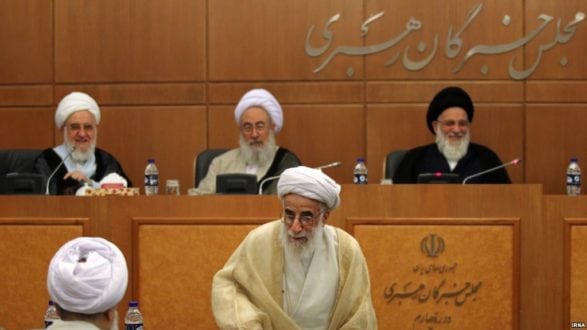Al-Monitor – Another race will be held concurrently with Iran’s parliamentary vote: The Assembly of Experts’ midterm election.
The Assembly of Experts is an 88-member clerical body in Iran tasked with choosing and monitoring the next supreme leader. Candidates must have a certificate of Sharia expertise or pass an exam from the Guardian Council on Islamic jurisprudence to run. Meanwhile, many believe that the hard-liner-dominated council rejected many of candidates for their affiliation with the Reformism current.
The assembly’s election is held every eight years, but a midterm is held every four years to replace those who have passed away or resigned. Most of the assembly’s members are over 70.
Some consequential decisions of the clerical body have included electing Ayatollah Hussein-Ali Montazeri as the deputy of Supreme Leader Ayatollah Rouhollah Khomeini in 1985 and Ayatollah Ali Khamenei as the new supreme leader in 1989.ALSO READIRANIran’s Khamenei defends pre-election purge of Reformists
The secret committee
In the Assembly of Experts, there are two important commissions named after Article 107 and Article 109 of Iran’s constitution. Article 107 concerns the qualities of the leader, including his knowledge of Islamic jurisprudence and political insight, and Article 109 states that the assembly is tasked with choosing the leader.
According to assembly member Morteza Moqtadai, there is also a secret sub-commission of three persons elected from the members of the two other commissions. The secret committee dates back 18 years. Assembly member Ahmad Khatami stated in 2017, “In the meeting of the Assembly of Experts with the Supreme Leader around 15 years ago, he said that you should have 10 [potential] leaders up on your sleeves. Based on this idea, a secret committee was formed to investigate figures who could be the leader.”
In a 2006 interview, Moqtadai elaborated on the function of the committee, saying, “This committee holds a meeting every week and their investigations are secret. Their documents are also classified. This three-member committee doesn’t even give its documents to other assembly members.” According to Khatami, however, “If the Supreme Leader wants, the names of [the potential figures to replace him] will be given to him, but he hasn’t asked for it so far.”
Ayatollah Akbar Hashemi Rafsanjani, a former assembly chairman, revealed that the commission once chose two candidates to replace the supreme leader after talking with hundreds of figures. However, he emphasized, the committee “makes no decisions and is only reviewing.”
According to Moqtadai, the committee members visit the house of potential candidates to assess their personal lives as well as their political insight and positions on foreign policy and domestic politics.
The British Ticket
As Khamenei ages, the assembly has been attracting attention. Four years ago, late Ayatollah Akbar Hashemi Rafsanjani, two-time president of Iran, laid out a plan to change the makeup of the assembly, which has been mostly controlled by hard-liners, by blocking the three most powerful hard-liner clerics: Mohammad-Taghi Mesbah Yazdi (spiritual leader of hard-line Endurance Front), Ahmad Jannati (secretary of the Guardian Council) and Mohammad Yazdi (secretary of the Society of Seminary Teachers of Qom).
The Reformists had high hopes for 47-year-old Hassan Khomeini, the grandson of the Islamic Republic’s founder, but he was disqualified by the Guardian Council. The Reformists claimed he council’s rejection was politically motivated as Khomeini had produced the required certifications. The hard-liners and radicals had campaigned fiercely against Rafsanjani and his candidates, labeling his list the “British Ticket.”
Since a large number of Reformist and moderate clerics have been rejected by the Guardian Council and barred from running in the election, Rafsanjani was forced to put a number of conservative figures alongside his allies on his ticket. Most of the clerics on his ticket won election, especially in capital city of Tehran, where Rafsanjani’s list won 15 out of 16 seats. Mesbah Yazdi and Mohammad Yazdi were both left out of the body, but Jannati managed to secure a place in the assembly.
Despite the victory, Rafsanjani and his allies remained a minority faction in the assembly, dissuading him from running for the chairmanship. Moderate Ayatollah Ebrahim Amini was nominated by Rafsanjani’s camp, but he lost to the Rafsanjani’s archenemy Jannati.
A midterm opportunity
Despairing over the mass disqualification of their candidates and believing that even successful candidates will be left ineffective in the parliament and the Assembly of Experts, many moderates and Reformists have decided not to run at all. Hence, the road seems clear for the hard-liners to take full control over both bodies. In some provinces, including Qom and Fars, the hard-liners face only one rival — from their own camp.
Under such conditions, Mohammad Yazdi and Mesbah Yazdi are likely to join their old friend Jannati in the assembly and influence future developments, exactly the situation the late Rafsanjani sought to prevent.
 Shabtabnews In this dark night, I have lost my way – Arise from a corner, oh you the star of guidance.
Shabtabnews In this dark night, I have lost my way – Arise from a corner, oh you the star of guidance.



